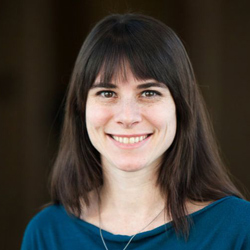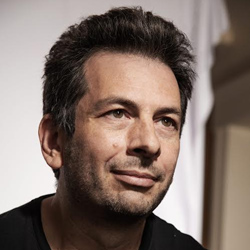Events
Past Event
WED@NICO SEMINAR: Niall Mangan, Northwestern Engineering "Identifying Models from Data: Traditional and Sparse-Selection Based Approaches"
Northwestern Institute on Complex Systems (NICO)
12:00 PM
//
Lower Level, Chambers Hall
Details

Speaker:
Niall Mangan, Assistant Professor of Engineering Sciences and Applied Mathematics, Northwestern University
Title:
Identifying Models from Data: Traditional and Sparse-Selection Based Approaches
Abstract:
Building models for biological, chemical, and physical systems has traditionally relied on domain specific intuition about which interaction and features most strongly influence a system. Statistical methods based in information criteria provide a framework to balance likelihood and model complexity. Recently developed for and applied to dynamical systems, sparse optimization strategies can select a subset of terms from a library that best describe data, automatically interfering model structure. I will discuss my group's application and development of data driven methods for model selection to 1) find simple statistical models to use wastewater surveillance to track the COVID pandemic and 2) recover chaotic systems models from data with hidden variables. I'll briefly discuss current preliminary work and roadblocks in developing new methods for model selection of biological metabolic and regulatory networks.
Speaker Bio:
Niall M. Mangan received the Dual BS degrees in mathematics and physics, with a minor in chemistry, from Clarkson University, Potsdam, NY, USA, in 2008, and the PhD degree in systems biology from Harvard University, Cambridge, MA, USA, in 2013. Dr. Mangan worked as a postdoctoral associate in the Photovoltaics Lab at MIT from 2013-2015 and as an Acting Assistant Professor at the University of Washington, Seattle from 2016-2017. She is currently an Assistant Professor of engineering sciences and applied mathematics with Northwestern University, where she works at the interface of mechanistic modeling, machine learning, and statistical inference. Her group applies these methods to many applications including metabolic and regulatory networks to accelerate engineering.
Location:
In person: Chambers Hall, 600 Foster Street, Lower Level
Remote option: https://northwestern.zoom.us/j/91243465578
Passcode: NICO2024
About the Speaker Series:
Wednesdays@NICO is a vibrant weekly seminar series focusing broadly on the topics of complex systems and data science. It brings together attendees ranging from graduate students to senior faculty who span all of the schools across Northwestern, from applied math to sociology to biology and every discipline in-between. Please visit: https://bit.ly/WedatNICO for information on future speakers.
Time
Wednesday, February 14, 2024 at 12:00 PM - 1:00 PM
Location
Lower Level, Chambers Hall Map
Contact
Calendar
Northwestern Institute on Complex Systems (NICO)
WED@NICO SEMINAR: Julio M. Ottino, Northwestern University "From Clocks to Clouds: The Complexity Revolution"
Northwestern Institute on Complex Systems (NICO)
12:00 PM
//
Lower Level, Chambers Hall
Details

Speaker:
Julio M. Ottino, Walter P. Murphy Professor of Chemical and Biological Engineering, McCormick School of Engineering, Northwestern University
Title:
From Clocks to Clouds: The Complexity Revolution: How Scientific Breakthroughs Reshaped Reality and Our Place Within It
Abstract:
For three centuries, Western thought was guided by a Newtonian worldview: the universe as a vast clock, predictable and controllable. That vision has unraveled. Scientific revolutions—from relativity and quantum mechanics to evolution, game theory, and complexity science—have revealed a world of uncertainty, emergence, and creative interconnection. We now inhabit a “cloud world,” where relationships matter more than parts, and uncertainty is not ignorance but potential. This talk traces the transformation from clocks to complexity, showing how these revolutions reshape our understanding of reality and what it means to navigate knowledge, organizations, and society in turbulent times.
Speaker Bio:
Julio M. Ottino is an engineering scientist recognized for his work in fluid dynamics, chaos and nonlinear dynamics, complex systems, and especially mixing. He was born in La Plata, Argentina and grew up with twin interests in the physical sciences and visual arts. He obtained his first degree at the University of La Plata, in Argentina, before receiving a PhD in chemical engineering from the University of Minnesota. He is currently at the McCormick School of Engineering and Applied Science in Northwestern University where he holds the titles of Robert R. McCormick Institute Professor and Walter P. Murphy Professor of Chemical and Biological Engineering. He is also a professor of Management and Organizations at Kellogg School of Management. He was the co-founder and director of the Northwestern Institute on Complex Systems (NICO) and the author of the Kinematics of Mixing: Stretching, Chaos, and Transport (Cambridge University Press 1989) and The Nexus, Augmented Thinking for a Complex World, with Bruce Mau (MIT Press, 2022).
Location:
In person: Chambers Hall, 600 Foster Street, Lower Level
Remote option: https://northwestern.zoom.us/j/99053647199
Passcode: NICO25
About the Speaker Series:
Wednesdays@NICO is a vibrant weekly seminar series focusing broadly on the topics of complex systems, data science and network science. It brings together attendees ranging from graduate students to senior faculty who span all of the schools across Northwestern, from applied math to sociology to biology and every discipline in-between. Please visit: https://bit.ly/WedatNICO for information on future speakers.
Time
Wednesday, November 5, 2025 at 12:00 PM - 1:00 PM
Location
Lower Level, Chambers Hall Map
Contact
Calendar
Northwestern Institute on Complex Systems (NICO)
WED@NICO SEMINAR: Blaise Aguera y Arcas, Google "Symbiogenesis, Computational Parallelism, and Complexity in Evolution"
Northwestern Institute on Complex Systems (NICO)
12:00 PM
//
Lower Level, Chambers Hall
Details

Speaker:
Blaise Agüera y Arcas, VP/Fellow, CTO of Technology & Society, Google
Title:
Symbiogenesis, Computational Parallelism, and Complexity in Evolution
Abstract:
Symbiogenesis-- the fusion of formerly independent self-replicating entities into a larger self-replicating entity-- is proposed as the driving force behind evolution's "arrow of time" toward ever-increasing complexity. We'll explore an Artificial Life system as a minimal motivating example, then discuss the implications for biological evolution beyond the "standard" accounts of Major Evolutionary Transitions and "intelligence explosions" in brainy species. Energetic and computational implications will also be addressed.
Speaker Bio:
Blaise Agüera y Arcas is a VP and Fellow at Google, where he is the CTO of Technology & Society and founder of Paradigms of Intelligence (Pi). Pi is an organization working on fundamental research in AI and related fields, especially the foundations of neural computing, active inference, sociality, evolution, and Artificial Life.
In 2008, Blaise was awarded MIT’s TR35 prize. During his tenure at Google, Blaise has innovated on-device machine learning for Android and Pixel; invented Federated Learning, an approach to decentralized model training that avoids sharing private data; and founded the Artists + Machine Intelligence program.
An External Professor at Santa Fe Institute and a frequent public speaker, Blaise has given multiple TED talks and keynoted NeurIPS. He has also authored numerous papers, essays, op-eds, and chapters, as well as two previous books, Who Are We Now? and Ubi Sunt. His most recent book, What Is Life?, is part 1 of the larger book What Is Intelligence?, forthcoming from Antikythera and MIT Press in September 2025.
Location:
In person: Chambers Hall, 600 Foster Street, Lower Level
Remote option: https://northwestern.zoom.us/j/98741396308
Passcode: NICO25
About the Speaker Series:
Wednesdays@NICO is a vibrant weekly seminar series focusing broadly on the topics of complex systems, data science and network science. It brings together attendees ranging from graduate students to senior faculty who span all of the schools across Northwestern, from applied math to sociology to biology and every discipline in-between. Please visit: https://bit.ly/WedatNICO for information on future speakers.
Time
Wednesday, November 12, 2025 at 12:00 PM - 1:00 PM
Location
Lower Level, Chambers Hall Map
Contact
Calendar
Northwestern Institute on Complex Systems (NICO)
Data Science Nights - November 2025 - Speaker: Feihong Xu, ESAM
Northwestern Institute on Complex Systems (NICO)
5:30 PM
//
Lower Level, Chambers Hall
Details

NOVEMBER MEETING: Thursday, November 20, 2025 at 5:30pm (US Central)
LOCATION:
In person: Chambers Hall, Lower Level
600 Foster Steet, Evanston Campus
AGENDA:
5:30pm - Meet and greet with refreshments
6:00pm - Talk with Feihong Xu, Amaral Lab, ESAM
Talk title and abstract TBA.
DATA SCIENCE NIGHTS are monthly meetings featuring presentations and discussions about data-driven science and complex systems, organized by Northwestern University graduate students and scholars. Students and researchers of all levels are welcome! For more information: http://bit.ly/nico-dsn
Time
Thursday, November 20, 2025 at 5:30 PM - 7:30 PM
Location
Lower Level, Chambers Hall Map
Contact
Calendar
Northwestern Institute on Complex Systems (NICO)
Data Science Nights - December 2025 - Speaker: Yash Chainani, Chemical Engineering
Northwestern Institute on Complex Systems (NICO)
5:30 PM
//
Lower Level, Chambers Hall
Details

DECEMBER MEETING: Thursday, December 18, 2025 at 5:30pm (US Central)
LOCATION:
In person: Chambers Hall, Lower Level
600 Foster Steet, Evanston Campus
AGENDA:
5:30pm - Meet and greet with refreshments
6:00pm - Talk with Yash Chainani, Broadbelt & Tyo Labs, Chemical Engineering
Talk title and abstract TBA.
DATA SCIENCE NIGHTS are monthly meetings featuring presentations and discussions about data-driven science and complex systems, organized by Northwestern University graduate students and scholars. Students and researchers of all levels are welcome! For more information: http://bit.ly/nico-dsn
Time
Thursday, December 18, 2025 at 5:30 PM - 7:30 PM
Location
Lower Level, Chambers Hall Map
Contact
Calendar
Northwestern Institute on Complex Systems (NICO)

